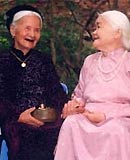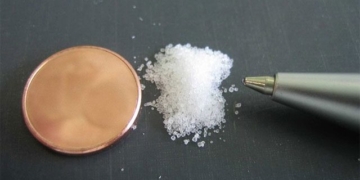In January, elderly people are particularly susceptible to illness, primarily due to the still cold spring weather and the rich, fatty foods that are typically consumed during the early days of the New Year, leading to nutritional imbalances.
 |
(Photo: Health & Life/VNE) |
In Vietnam, January is the coldest month of the year. The average air temperature in the plains often falls below 15 degrees Celsius, with some days dipping below 5 degrees Celsius; in mountainous areas, temperatures can be even lower, typically ranging from 5 to 15 degrees Celsius. In such weather conditions, the elderly are highly vulnerable to colds and pneumonia. If they catch the flu, the illness can become severe and lead to complications such as pneumonia, with unpredictable and adverse developments. Chronic diseases like arthritis, peptic ulcer disease, and hypertension often flare up; those with pre-existing hypertension are particularly at risk for strokes.
During the early days of the New Year, food is abundant, with many delicious delicacies: meats, sausages, cold cuts, braised pork, sticky rice cakes, jams, candies, soft drinks, fine wines, coffee, and tobacco… There is an overabundance of everything, available in every household, at every meal, mostly consisting of ready-to-eat, cold dishes that can easily spoil… Without proper management of the situation, one can easily overindulge or become overloaded, leading to fatigue and even illness. Mild symptoms may include bloating and indigestion; severe cases can result in diarrhea, triggering latent health issues in the elderly such as elevated cholesterol, hypertension, and diabetes.
At the end of the year, everyone is busy balancing work while preparing for the Tet holiday, often feeling fatigued. Daily routines are disrupted with increased socializing and visitor traffic, leading to irregular sleep and rest patterns, and often forgetting to take afternoon naps. Nighttime sleep is frequently shortened. Regular physical activity or walking, which is essential for many elderly individuals, tends to be neglected during Tet celebrations. All these factors contribute to fatigue and stress among the elderly…
Protecting Elderly Health During the Early Spring
Regularly dress warmly, paying attention to keeping the head, neck, chest, and feet warm. Avoid traveling long distances and late-night outings; during cold spells, especially, stay indoors and avoid going outside after consuming alcohol or beer to prevent colds.
Maintain regular routines for eating, resting, and daily activities.
Regarding diet, meals should be regular; avoid skipping meals, but also refrain from overeating. Although delicious, one should only eat moderately, aiming to fill the stomach to about 70-80%. Overeating can create digestive stress and lead to negative consequences. For instance, individuals with heart conditions may experience blood pooling in the stomach for digestion, leading to localized ischemia in the heart and brain. This can result in angina, heart attacks, insomnia, headaches, tinnitus, dizziness, decreased concentration, and even strokes if there is a history of circulatory insufficiency. To prevent these issues, everyone should heed the advice of renowned physician Hải Thượng Lãn Ông Lê Hữu Trác: “It is better to feel slightly hungry than to be overly full.”
What Should the Diet of the Elderly Look Like? It is essential to reduce fatty foods (such as cold cuts and fatty meats) and avoid high-cholesterol foods (including various meats, especially fatty cuts and organ meats). Limit sugar intake (reduce consumption of soft drinks, jams, and candies), ensure adequate hydration, and eat plenty of fresh fruits and vegetables to provide essential minerals and vitamins, particularly strong antioxidants like vitamins C and E, and beta-carotene. Dark leafy greens, herbs (such as green onions, basil, cilantro, garlic), and a variety of fruits available during Tet, such as oranges, tangerines, persimmons, ripe mangoes, ripe papayas, and watermelons, are all rich in vitamin C and beta-carotene.
“Alcohol should not be forced,” so don’t overindulge just to please friends or family. Ideally, alcohol should only be used as an aperitif; even red wine. This type of wine has been shown to have beneficial effects on blood circulation, blood pressure, antioxidant properties, neutralizing free radicals, and anti-cancer effects, but for healthy individuals, French scientists recommend limiting consumption to one glass per meal, and always remember to eat while drinking (do not drink alcohol on an empty stomach).
Dr. Bạch Thông, Health & Life




















































